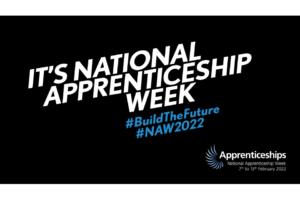To mark National Apprenticeship Week 2022 we wanted to challenge some of the perceptions of apprenticeships.

Can an apprenticeship lead to a high level professional career? The very short answer to that question is yes. But sadly many young people, parents and even employers, rule them out as they have an outdated view of what they are and don’t realise that they now offer an alternative pathway to many high level jobs, including in banking, accountancy, law and technology.
Apprenticeships have been around for centuries (the first national system of apprenticeships was introduced in 1563, when Queen Elizabeth I was on the throne). They are a historic and long established means of gaining on-the-job training and traditionally they are seen as going hand in hand with manual skilled professions, such as carpentry or plumbing.
However, recent reforms to apprenticeships has resulted in a huge expansion in the range of opportunities available. Apprenticeships are now offered across 1,500 job roles and at four levels, including degree apprenticeships. And the introduction of the Apprenticeship Levy in 2017 means that employers are incentivised to offer them, including in professions that are often associated with being for University graduates only, such as banking, insurance and law. `
Ironically, but perhaps not surprisingly, it is the wealthier students who are taking advantage of these newer apprenticeship opportunities. Data published in 2019 found that more than half of school-leavers who started a degree-level apprenticeship were from the most privileged social backgrounds. A trend we in part hope to change via our work with both young people and employers, as we believe apprenticeships should be one of the levers that helps to increase social mobility, not embed inequalities further.
With this in mind, below we have outlined our top tips for different key groups when it comes to apprenticeships for professional careers, drawing on insights from Belinda Waiswa, our Placement & Recruitment Manager and Annie Walker, our Business Administration and Recruitment Apprentice.

For young people
- Sign up to our Apprenticeship 101 Webinar, 4.30-5.30pm on 23 February to get a full run-down of all things apprenticeships!
- Sign up here as a Brokerage Candidate to get full access to our range of opportunities, including careers insights, mentoring, placements and apprenticeship roles.
- You can also seek out case studies and profiles of people currently doing an apprenticeship in the field you are interested in to get an idea of what it will be like. You can read about the experience of our own Business Administration and Recruitment Apprentice here and one of our corporate partners, Markel, shares a day in the life of a Cyber Apprentice here. Joseph, a Brokerage Candidate who we helped place in a Broking Apprenticeship, talks about his experience here.
- We also address some other myths about apprenticeships in this TikTok video.
For parents and carers
- Don’t rule out apprenticeships for your young person without learning more about them – come along to our free Apprenticeship 101 Webinar, 4.30-5.30pm on 23 February to find out about the range of apprenticeships available and the successful careers they can lead to.
- Your child can apply for university and an apprenticeship at the same time. Once they have investigated all routes into work, they can make their final decision.
- As well as being paid a wage to do an apprenticeship, the education and training elements are also paid for by the employer, so your child will have no student debt as well as the qualifications needed for their role.
- More helpful information for parents and carers is available here.
For employers
- Career development isn’t one size fits all and the most inclusive organisations are ones that offer a range of ways that individuals can join and progress. Apprenticeships are an important part of developing an accessible early careers offer.
- Apprenticeships shouldn’t be reserved for just one area of your business and we encourage employers to explore ways that apprenticeship roles can be integrated alongside more traditional entry-level routes, even for the most skilled functions.
- It is not just enough to simply offer apprenticeships and pat yourselves on the back as an organisation that is accessible to young people. As the data highlighted above shows, apprenticeships, particularly at a higher level, are disproportionately going to students from wealthier backgrounds. Therefore it is important to ensure that your opportunities are also visible to students from working class and underrepresented backgrounds, something that we at The Brokerage can support with as part of our partnership offer.
- Further details about developing an apprenticeship programme and the range of Government support available can be found here.



 '
'